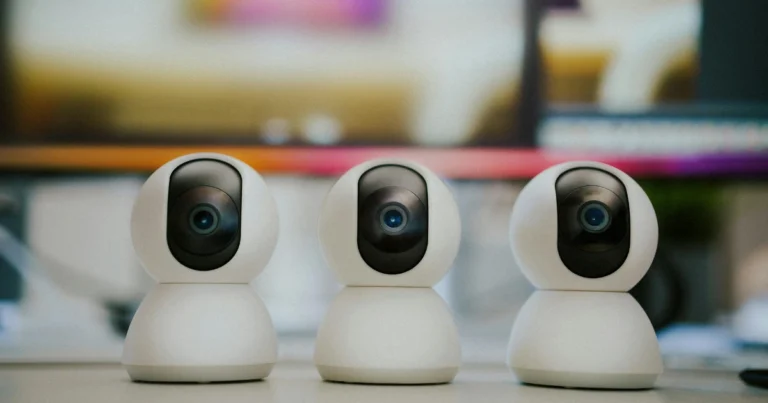Security cameras play a crucial role in home security systems. They deter crime, allow you to monitor your property, and capture evidence if a crime occurs. If you consider adding security cameras to your home, here’s what you need to know.
Benefits of Security Cameras
Installing security cameras in your home offers several advantages:
- Crime Deterrence: Criminals often reconsider targeting homes with visible cameras. They understand the increased risk of capture and prosecution.
- Property Monitoring: If you frequently travel or own multiple properties, cameras let you keep an eye on your home from afar.
- Evidence Collection: Should a crime occur, cameras provide valuable evidence to help identify and prosecute culprits or support insurance claims.
- Peace of Mind: Knowing your home remains under surveillance, especially in high-crime areas or if vulnerable family members live there, offers invaluable peace of mind.
Types of Security Cameras
The market offers various security cameras, including:
- Wired Cameras: These connect to power and recording devices via cables. They are more reliable than wireless versions but may be harder to install.
- Wireless Cameras: Without cables connecting them to power or recording devices, these cameras boast easier installation. However, they might need to be more reliable and often have limited battery life.
- Indoor Cameras: Designed for interior use, these cameras are usually smaller and more discreet than their outdoor counterparts.
- Outdoor Cameras: Typically, weatherproof cameras offer a broader view than indoor ones.
Choosing the Right Security Camera Features
Consider the following when selecting a camera:
- Resolution: Cameras with higher resolutions deliver clearer images.
- Field of View: A camera’s field of view dictates the surrounding area it can capture. While a broader view can monitor vast areas, it might sacrifice image detail.
- Night Vision: This feature is vital for nighttime property monitoring.
- Motion Detection: Cameras with motion detection only record when they sense movement, conserving storage and simplifying footage review.
- Remote Viewing: The ability to check camera footage from anywhere with internet access proves invaluable for homeowners on the go.
Protecting Your Security Cameras
After installation, ensure your cameras’ safety:
- Strategic Placement: Position your cameras where they’re discreet yet functional, like near entry points.
- Weatherproofing: For outdoor setups, choose cameras built to weather the elements.
- Securing Cameras: Use sturdy mounts and tamper-proof hardware. Consider security cages for added protection.
- Regular Monitoring: Periodically review footage to ensure camera functionality and check for unusual activities.
How ProTech Security Cameras Supports You
ProTech Security Cameras offers a diverse selection of top-brand cameras to safeguard your home. We provide expert installation, ensuring optimal setup and performance and considering adding cameras to your home. Contact ProTech Security Cameras for a complimentary quote and consultation.

Types of security cameras
Security cameras come in various types, each with unique pros and cons. Let’s delve into the most prevalent types of security cameras:
Wired Cameras: These cameras connect to power sources and recording devices through cables. They often prove more reliable than wireless cameras and offer more security as they’re harder to hack. However, their installation might pose challenges.
Wireless Cameras: Unlike wired versions, these don’t use cables to connect to power or recording devices. They simplify installation but might need to match the reliability of wired models. Their susceptibility to hacking is also higher.
Indoor Cameras: Designed specifically for home interiors, these cameras are usually more compact and discreet than their outdoor counterparts. They also tend to be more budget-friendly.
Outdoor Cameras: Built for exterior use, these cameras are usually weather-resistant and provide a broader viewing angle. They generally cost more than indoor cameras.
Bullet Cameras: Resembling a bullet in shape, these small, discreet outdoor cameras can attach to walls or ceilings. Their weatherproof nature and wide view make them ideal for home security.
Dome Cameras: Shaped like domes, these cameras, suitable for indoor and outdoor usage, often withstand vandalism better than bullet cameras. Their durability makes them ideal for commercial security in various settings.
PTZ Cameras: Standing for “pan-tilt-zoom,” users can remotely control these cameras to focus on particular areas. They’re great for expansive areas like parking spaces or warehouses.
Infrared Cameras: These cameras excel in low or zero light, making them perfect for nighttime surveillance.
Specialized security cameras also include:
License Plate Cameras: Tailored to capture license plate images, businesses use them to monitor employee or customer vehicles.
Traffic Cameras: These monitor traffic patterns, assisting businesses and governmental bodies identify congestion and traffic flow.
Body-Worn Cameras: Often worn by law enforcement and security personnel, these small cameras record public interactions.
When selecting security cameras, factor in your specific requirements and budget. The environment where you’ll install the cameras is also crucial. For instance, outdoor business locations necessitate weatherproof and vandal-resistant cameras.
ProTech Security Cameras can guide you to the best camera choice tailored to your needs. We’re here to assist with a broad spectrum of top-brand cameras and offer professional installation.


